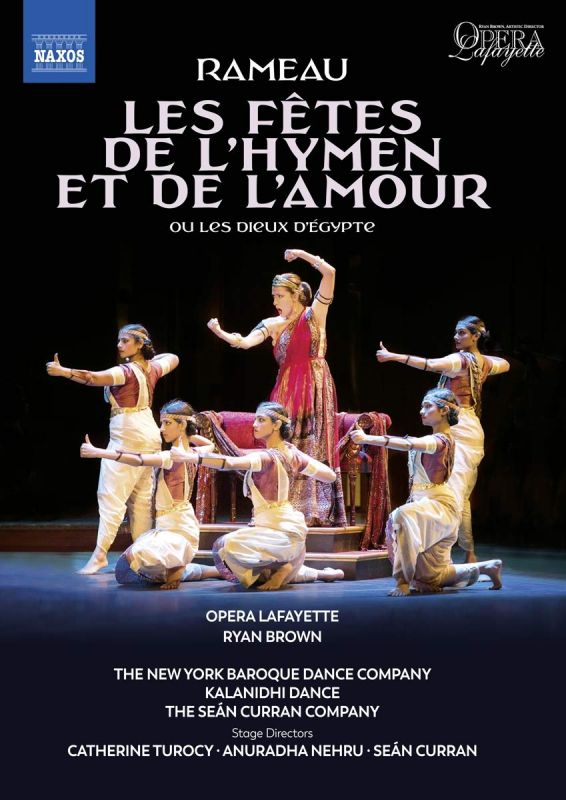RAMEAU Les fêtes de l’Hymen et de l’Amour (Brown)
View record and artist detailsRecord and Artist Details
Composer or Director: Jean-Philippe Rameau
Genre:
Opera
Label: Naxos
Magazine Review Date: 03/2019
Media Format: Digital Versatile Disc
Media Runtime: 148
Mastering:
DDD
Catalogue Number: 2 110393

Tracks:
| Composition | Artist Credit |
|---|---|
| (Les) fêtes de l'Hymen et de l'Amour (Les Dieux |
Jean-Philippe Rameau, Composer
Claire Debono, Orthésie; Orie, Soprano François Lis, Canope, Bass Ingrid Perruche, Myrrine; Memphis, Soprano Jean-Philippe Rameau, Composer Jeffrey Thompson, Osiris; Aruéris, Tenor Lafayette Opera Chorus Lafayette Opera Orchestra Ryan Brown, Conductor |
Author: Richard Lawrence
The original title was Les dieux d’Égypte (‘The Egyptian Gods’). Each entrée ends with the wedding of a god: Osiris, Canope and Aruéris (Horus) respectively. In the prologue, Cupid is depressed at losing his power to Hymen, the god of marriage; Hymen arrives, the two gods are reconciled, and they rejoice in the royal union. As in The Magic Flute, to take a familiar example, the Egyptian setting provided an opportunity for references to freemasonry: in the first entrée, Osiris brings enlightenment to the savage Amazons; the third features competitive games in honour of Isis.
Although there are of course a lot of dances, they are not irrelevant interludes: Cahusac was skilled in devising what he called ballets figurés, dances that are intrinsic to the story. Some are short, played in rapid succession, which makes the frequent interruptions of applause in this production rather irritating. Sometimes the stage directions are followed, as when Cupid gives Hymen two golden arrows and they exchange torches; at other times the dancing seems abstract, but it’s hard to be sure as the camera often cuts away from the action to show the orchestra. The piece is fully staged, but with no scenery; conductor and orchestra are behind the singers and dancers, and the chorus – singing from scores – is in the balcony.
Cahusac set much store by special effects. We don’t see the overflowing of the Nile, but Rameau’s depiction is vivid enough: scurrying descending scales in the orchestra, with a double chorus and two bass soloists. Nor, sadly, do we see Canope arriving in a chariot drawn by crocodiles. But the costumes – in a sort of timeless oriental style – are splendid. So, as ever, is Rameau’s writing for the dances and the choral numbers. The solos move seamlessly between recitative and arioso. The airs include a prayer to Cupid, ‘Veille Amour’, expressively sung by Ingrid Perruche, and a tender number for an Egyptian shepherd, ‘Ma bergère fuyait l’amour’, with musette accompaniment: Kyle Bielfield sings it gracefully, with lightly touched top Cs (sounding B flat).
The cast boasts two more excellent hautes-contre in Aaron Sheehan and Jeffrey Thompson. Claire Debono occasionally sounds uncomfortable at the top of her register, but it’s not too serious. Ryan Brown, using the new critical edition by Thomas Soury, conducts the Opera Lafayette Orchestra and Chorus with both vigour and sensitivity. I wish I could be as enthusiastic about the balance of the recording: the orchestra sometimes fades away alarmingly, and the timpani are much too prominent. But overall this is well worth acquiring, to set alongside Le Concert Spirituel and Hervé Niquet on CD (Glossa, 12/14), which has the advantage of a booklet that includes the stage directions with the libretto.
Discover the world's largest classical music catalogue with Presto Music.

Gramophone Digital Club
- Digital Edition
- Digital Archive
- Reviews Database
- Full website access
From £8.75 / month
Subscribe
Gramophone Full Club
- Print Edition
- Digital Edition
- Digital Archive
- Reviews Database
- Full website access
From £11.00 / month
Subscribe
If you are a library, university or other organisation that would be interested in an institutional subscription to Gramophone please click here for further information.




